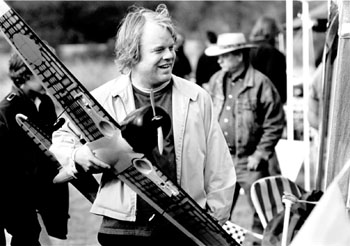![[Metroactive Movies]](/movies/gifs/movies468.gif)
[ Movies Index | Show Times | Silicon Valley | Metroactive Home | Archives ]
Model Citizen: Philip Seymour Hoffman hides his addiction behind his hobby in 'Love Liza.'
Gas Huffer
Unlovable 'Love Liza' stretches 45 minutes of plot into an hour and a half
By Richard von Busack
AMERICA'S ADDICTION to petroleum just took a turn for the worst, as witnessed by Todd Louiso's very precious small film Love Liza. It features America's wettest actor, Philip Seymour Hoffman. He plays Wilson, a grieving spouse recovering from the inexplicable suicide of his wife, Liza. Wilson, a web designer, lets everything go to pieces, despite rescue attempts by his friend Maura (Sarah Koskoff).
Throughout the film, Wilson carries around a suicide note, unopened. His severely coiffed, sometimes bullying, sometimes coddling ex-mother-in-law (Kathy Bates) is curious to see the contents of this last letter, so the two battle it out. No sir, I didn't buy it. Not Wilson's compulsion to sniff gasoline to kill the pain, not the strange mother-in-law relationship, not the device of the unopened letter. (The letter reads in ink invisible to everyone but Wilson, "When you open me, you will have symbolically accepted your wife's death.")
There are those who are flabbergasted by Hoffman and his counterpart, John C. Reilly, every time they're onscreen. Perhaps the two could unite and make some kind of anhedonic buddy movie? Having actors pretend to be boring and unattractive "little people" is almost always a fraud. Really boring and ugly people are a far rarer species in real life than they are on television and the movies. Depend on it, every time you think you've discovered someone who seems like a total bore, he or she will do or say something interesting and spoil the illusion. Take Jack Kehler, playing Denny, the friend Wilson makes through gas huffing--or rather, through the enthusiasm for model planes and boats that Wilson fakes to conceal his addiction to petroleum. Kehler is no one's idea of a Greek god. Yet he has a kind of anti-charisma and uncool charm that the lead lacks. He's not acting ugly, as Hoffman does.
Hoffman slouches through this depressing thing looking like a beluga whale with a bad haircut, deliberate suctioning the life out of the part. He refuels those horrible circular arguments heard outside theaters showing About Schmidt: it's patronizing; no, it's not patronizing--he's being deliberately boring because he's satirizing boring people; aha, but satirizing boring people is patronizing; and so forth. The missed point is that, as written (in the script by Gordy Hoffman, Philip Seymour's brother), he's supposed to be interesting enough to attract women and inspire loyalty. He even perks up for a very cushy job, right before Lady Gasoline lures him back to the rag and the spout.
Louiso stretches the tale to include more scenes of Wilson getting gassed. With true Cassavetes-style banality, Wilson makes the rounds like a junkie, arguing with attendants to sell him gasoline. (Research! The most dedicated huffer couldn't go through an entire gallon during the course of a month!). The shtick with gas is deliberate fanciness, when hard drinking would have served the purposes of this featherweight story just fine. With neither enough poetry, or common sense, Love Liza runs out of gas.
[ Silicon Valley | Metroactive Home | Archives ]
![]()

Photograph by Tobin Yelland
Love Liza (R; 90 min.), directed by Todd Louiso, written by Gordy Hoffman, photographed by Lisa Rinzler and starring Philip Seymour Hoffman and Kathy Bates, opens Friday at selected theaters valleywide.
Send a letter to the editor about this story to letters@metronews.com.
From the January 30-February 5, 2003 issue of Metro, Silicon Valley's Weekly Newspaper.